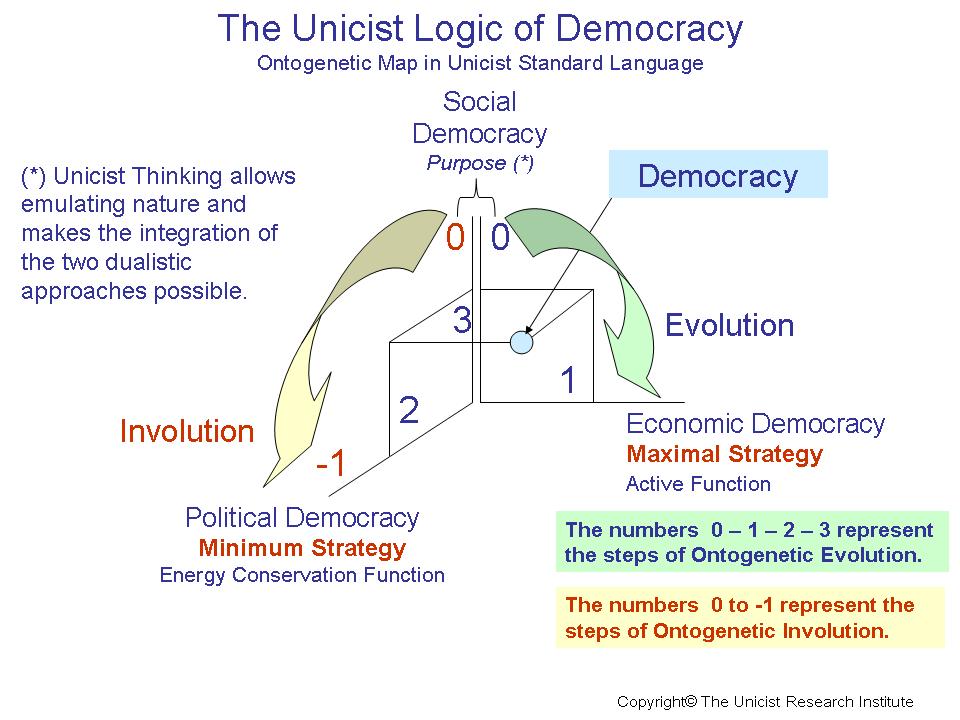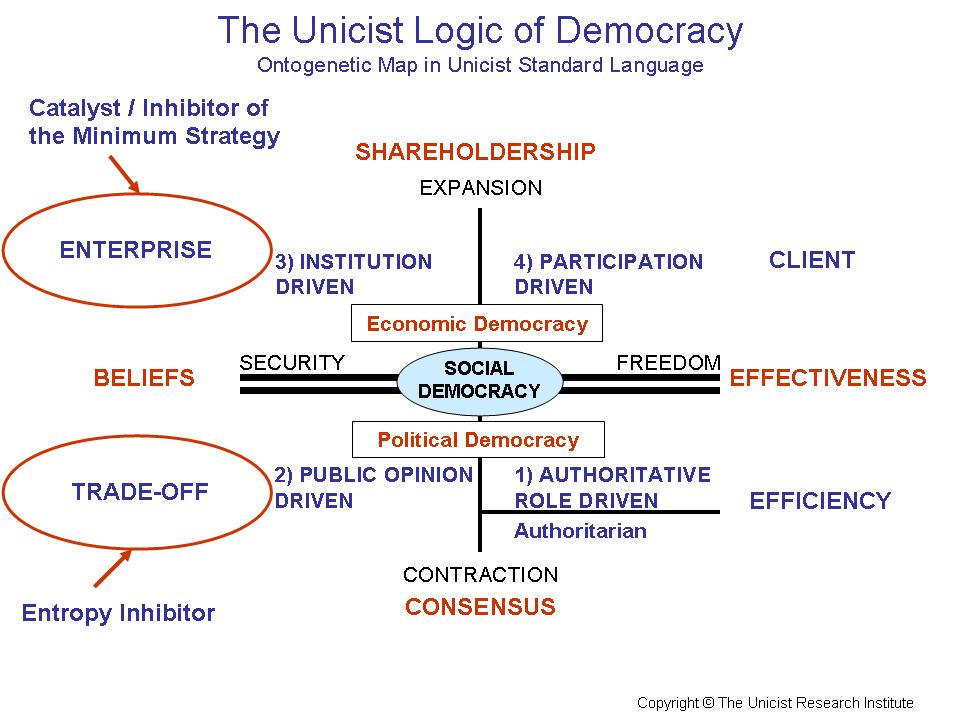The Future of Democracy (Part 1): Understanding Social, Economic and Political Democracy
Democracy is a social system that is based on the participation of the members of a society or institution in its government. Democracy is a system that has a natural structure, which includes mechanisms that drive its evolution or involution.
To understand the nature of democracy it is necessary to define that democracy is a system to deal with the domestic aspects of a society or institution. It adopts many shapes depending on the environment. Civil, military and religious environments have different ways to achieve consensus and thus democracy behaves differently in each one of these environments.
Understanding the nature of a society implies integrating a social scenario that defines the structure of social behavior, an economic scenario that deals with their materialistic aspects and a political scenario that deals with the establishment and administration of the ideologies and rules the members have to follow in order to be accepted as part of the community.
Thus, democracy has three integrated structures that define it; democracy includes a social, an economic and a political democracy.
 A democratic process necessarily begins with the existence of a social democracy. The principles of the French Revolution are an example of social democracy. “Liberty, equality and fraternity” represent those values that are implicit in democracy considering the characteristics of the French archetype.
A democratic process necessarily begins with the existence of a social democracy. The principles of the French Revolution are an example of social democracy. “Liberty, equality and fraternity” represent those values that are implicit in democracy considering the characteristics of the French archetype.
Democracy is built upon the social democracy of a society or institution. The economic democracy is the materialization of the social democracy in an environment. The triadic structure is then completed by the political democracy, which sustains the social democracy avoiding that the economic democracy changes the nature of the social democracy that represents the archetype of the culture.
The constitution of a country is the materialization of the social democracy of its society and establishes its basic rules. This means that when countries change their Constitutions they are making a re-foundation, which necessarily implies the destruction of what exists, and the building of something new, which implies a change in their archetype.
Constitutions should only be amended in order to respect the nature of the culture.
The Ontogenetic Map of Democracy
Social democracy can be defined as the integration of cooperation, participation and competition. The principles of the French revolution – liberty, equality and fraternity – are an example of a conceptual structure of the social democracy of a culture.
Every culture has its archetype that implicitly defines the structure of the social democracy, which drives the democratic system. Cultures that have an archetype that is still in transition cannot establish a fully democratic environment, because their social democracy is unstable and changing.
The Maximal Strategy
A democratic system naturally evolves or involves. Its evolution is driven by its maximal strategy, which is given by the economic democracy. Economic democracy exists when the productive entities of the environment are owned through the participation of their clients. In this case, clients and shareholders are “one”.
Economic democracy implies that the stock market integrates clients with shareholders and the market regulates the benefits of the entrepreneurs who do not participate in the stock markets.
The values implicit in the economic democracy are redundant with the values of social democracy while “enterprising” drives competition to an institutionalized superior level. In an economic democracy, the concept of shareholdership is redundant with cooperation, while the actions of the clients are a way of participation.
Depending on its presence or absence, Enterprising can either be the catalyst or inhibitor of democracy. Democracy cannot evolve without an institutionalized economic activity. This institutionalization needs to include rules to manage both enterprising and entrepreneurial activities.
The Minimum Strategy
When social and economic democracies are given, the existence of a political democracy becomes necessary. Political democracy implies that governmental actions have consensus among the members of a society, that they are efficient in terms of fulfilling their expectancies and that the necessary trade-offs are made to ensure that consensus and efficiency become possible.
Consensus does not imply efficiency and vice-versa. Therefore, trade-offs are the necessary entropy inhibitor that allows developing political democracy.
The risk of this entropy inhibitor can be seen in two extreme situations: on the one hand, when trade-offs are not used, they work as political inhibitors and, on the other hand, when used in extreme conditions, they drive towards corruption.
Political democracy establishes the limits of actions of economic democracy in order to ensure the achievement of the goals that are implicit in social democracy. It requires, as a basic condition, the separation of governmental actions from State actions.
Governments are in the hands of politicians who necessarily tend to be focused on elections, which drive them naturally to satisfy the short-term needs of the voters. This drives political democracy towards the inefficiency of “following the needs of the participants” without integrating the long-term possibilities and the needs of the following generations.
State administration is in the hands of officers who need to be focused on fulfilling the goals established using the procedures of the administration. Their goal is to make the administration of the public affairs effective and provide the actions that ensure the long-term objectives of the cultures.
The State action needs to be trans-governmental, which means that it has to fulfill its goals beyond the circumstantial needs of a government. When governments invade the organization of the State, there is no possibility to develop an evolutionary democracy.
Types and Levels of Democracy
In the research on the nature of democracy, four levels of adaptive democracy have been discovered together with one over-adaptive level that deals with authoritarianism, which uses manipulative actions to achieve consensus.
- Authoritative role driven democracy
- Public opinion driven democracy
- Institution driven democracy
- Participation driven democracy
First Level: Authoritative driven democracy
Democracy implies that people share a vital space and have a strong social capital and that there is a democratic alternation. The first level implies that people who have the necessary qualifications occupy the leading roles in a community. This level of democracy implies having a reliable system to ensure that those who achieve the role have the necessary talents to administrate the community’s interests. The role of the State organization is basic to ensure the effectiveness of this level.
Second Level: Public opinion driven democracy
This level includes the first level plus the characteristic that the public opinion prevails over the opinion of the politicians. It requires monitoring these opinions and making governmental actions transparent in order to allow people to understand what is happening. The weakness of public opinion is the long-term aspect of decisions, which is basically not considered in massive behavior. The role of the State organization limits the influence of public opinion to ensure the functionality of the administration in the long and short term.
Third level: Institution driven democracy
This level includes the second level plus the characteristic that the social, economic and political actions are institutionalized. It implies that the social, economic and political agents participate in the governmental decisions through the institutions they belong to. It implies a structural democratic organization of the political parties in order to ensure that the democratic alternation provide a structural approach to the public affairs. It implies that the gap between alternating parties is small enough to allow a transition that does not drive to the annulment of the decisions of preceding governments.
Fourth Level: Participation driven democracy
This level includes the third level plus the organization of the direct participation of people in all the aspects that deal with their need to have a real vital space where they can evolve. This participation implies that the leaders assume a full responsibility for representing the interests of the community in their proposals. This level drives cultures towards a superior level of influence in the environment. Thus, it requires that all the conditions to live in an evolutionary democracy be given.
Democracy cannot be Imported / Exported
Importing political democracy from more democratic cultures only drives to the corruption of the preexisting system and the installation of a dualistic democracy in order to avoid anarchy. As it was presented in the research, the dualistic democracy has two extreme alternatives: populist / leftist democracies and liberal / rightist democracies.
When democracy needs to be upgraded, it is necessary to begin by developing social democracy, which requires beginning with education.
Democracy implies freedom and freedom implies responsibility.
Based on social democracy, the next step to upgrade democracy is to install a superior level of economic democracy, which will then drive naturally towards the need of a political democracy. This implies a spiral step-by-step evolution that demands generations.
Peter Belohlavek
NOTE: The Unicist Research Institute was the pioneer in using the unicist logical approach in complexity science research and became a private global decentralized leading research organization in the field of human adaptive systems. It has an academic arm and a business arm.
http://www.unicist-school.org/future-research/wp-content/uploads/2014/09/turi-1.pdf

